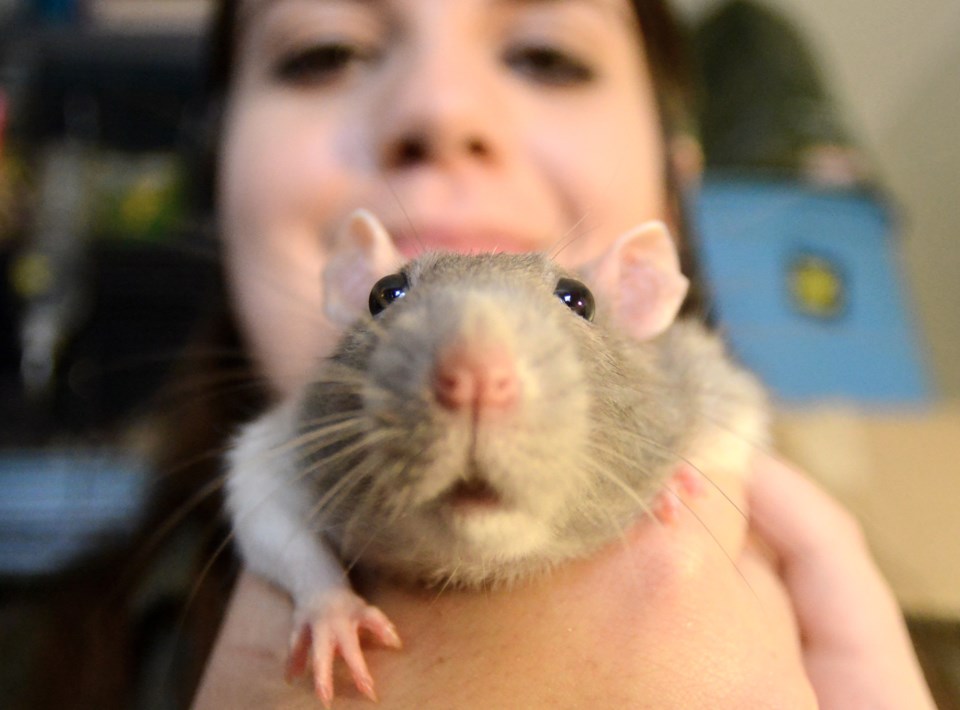There are 76 rats living in the stacked cages of Rebecca Feddema's Paisley Street apartment and she knows the names of every one of them.
Jabba ... Cinderella ... Azelia ... Elliot ... the list goes on. And on.
"I know the personality of every rat in this room. I spend time with them on a daily basis. When I'm studying I have rats running around on the couch with me," says Feddema, a third-year University of Guelph student working towards becoming a veterinarian.
"If someone wants a rat and they have children, I know which rat would be suitable," she says.
Feddema runs Guelph Rat Save, a self-started, volunteer-run enterprise that saves domestic rats from what is usually an untimely end or from being released into the wild.
She adopts them out, finds temporary foster homes or keeps them herself.
Rats, she says, get a bad rep. They make great pets. They're smart, usually social and inexpensive to keep.
"They're a very misunderstood animal," Feddema says. "They're super sweet, super friendly and low maintenance."
The rats at Guelph Rat Save are not the wild rats you might find rummaging in your garbage or snacking under your bird feeder. Guelph Rat Save rats were all bred domestically to be pets, reptile food or to be used in laboratories.
Hairless, standard, rex and double rex rats make up the collection at Guelph Rat Save. Fundraising and donations pay for all the supplies and vet care.
"Originally I had my own personal rats," says Feddema, who started adopting rats about two years ago. Then people started coming to her.
"More and more people started to ask me for help with their rats. Then the Guelph Humane Society started asking me to take rats."
Eventually she started adopting them out because "that was the only way I was going to be able to help them all."
These days she takes rats from humane societies around the province, including Belleville, Milton, Toronto and Timmins, where they don't have the experience or resources to care for or look after them. She saves many from being euthanized.
"Most of our rats come from shelters. People drop them off. Their children outgrow them or there's a family situation ... or they just don't want them any more," Feddema says. "A lot of people see them as expendable animals."
She does not breed rats, nor will she adopt them out to people who plan to.
"They all have their own personalities says Eva Amaya, who volunteers looking after the rodents, which come in all shapes, sizes, colours and levels of furriness.
"They learn their names. They know when they're in trouble. They're very smart," Amaya says.
Feddema's love of animals was formed at an early age when her parents started a cat rescue in their Welland home.
The rat love started when she was in a pet store admiring rats one day, only to learn they were feeder rats for large snakes.
She bought those rats to save them, she says, and whether she knew it or not at the time, Guelph Rat Save was born.
At Feddema's apartment the rats are separated. No boys and girls together for obvious reasons. Young females (which can be aggressive) are separated, as are older rats. There's even a special hospice care cage. A particularly aggressive rat gets his own digs.
Feddema's efforts don't stop at rats. She has a number of cats, rabbits and a gerbil. There's usually guinea pigs, but they are all out in foster care right now.
She is bracing for Easter, when a post-holiday "rabbit dump" usually leads to her being overwhelmed with rabbit drop-offs.
Eventually the plan is to fundraise so that the rat save can be moved to a bigger and more accessible location.
More information on Guelph Rat Save and how to contact them can be found on their Facebook page.
